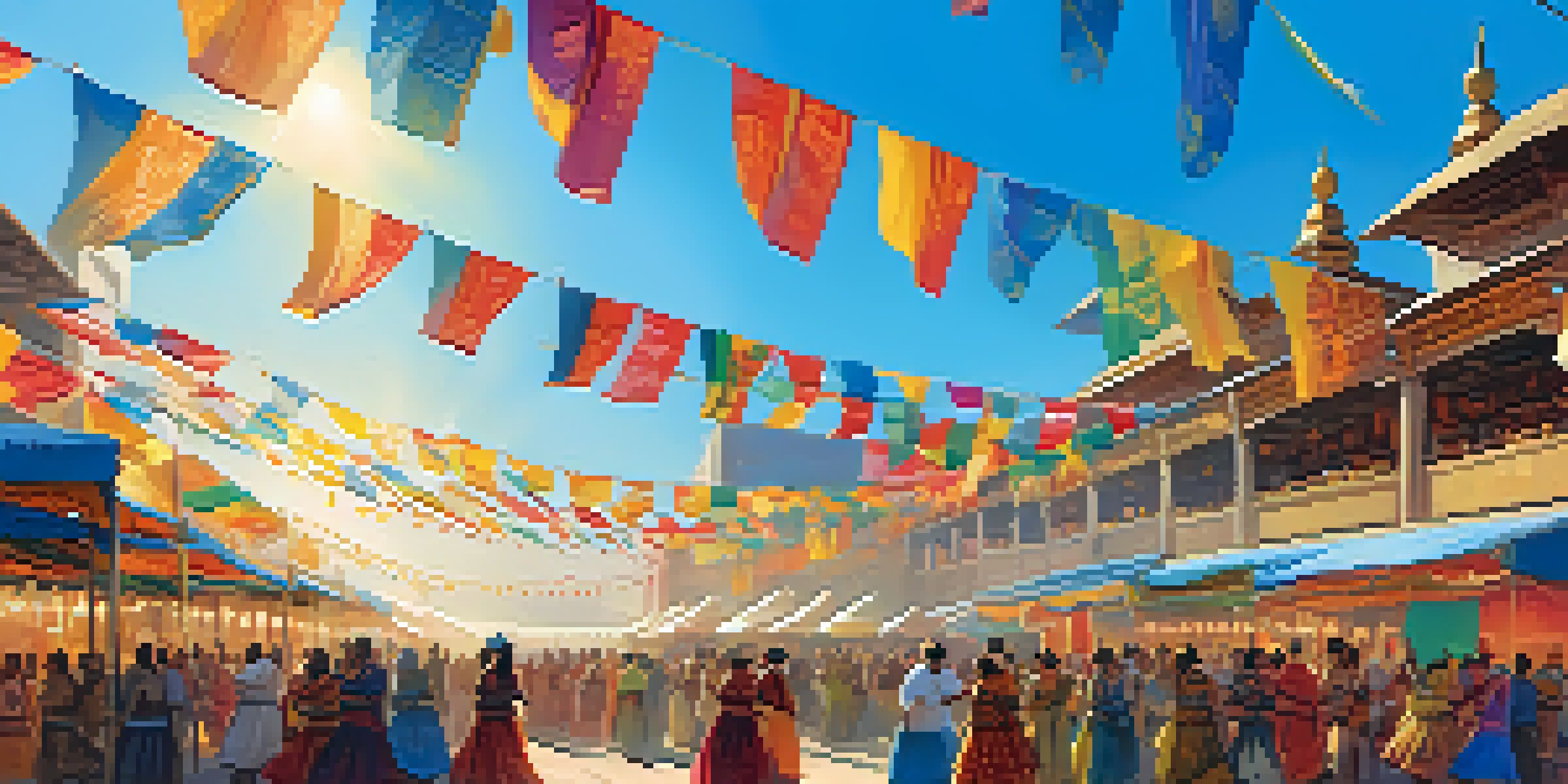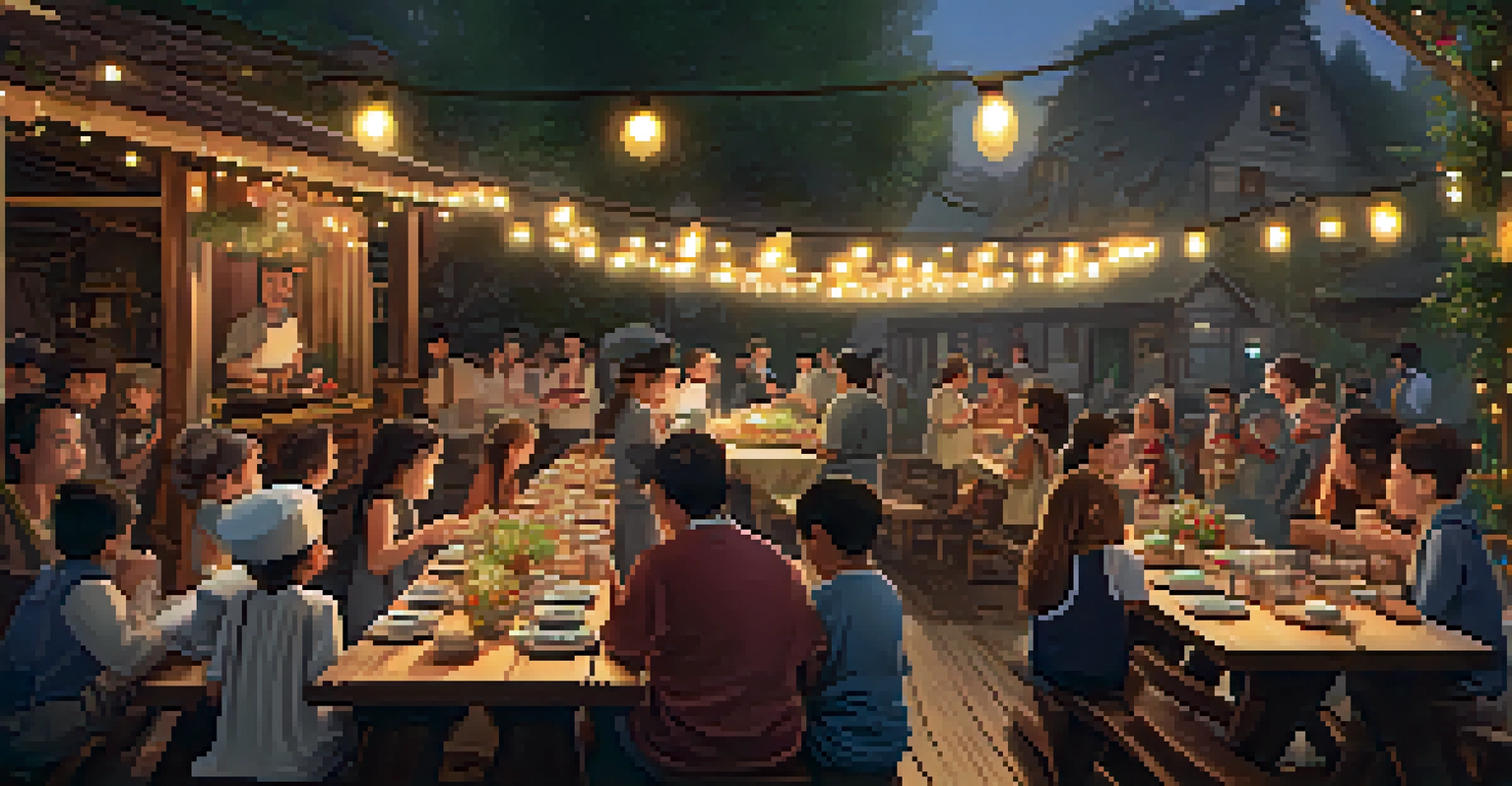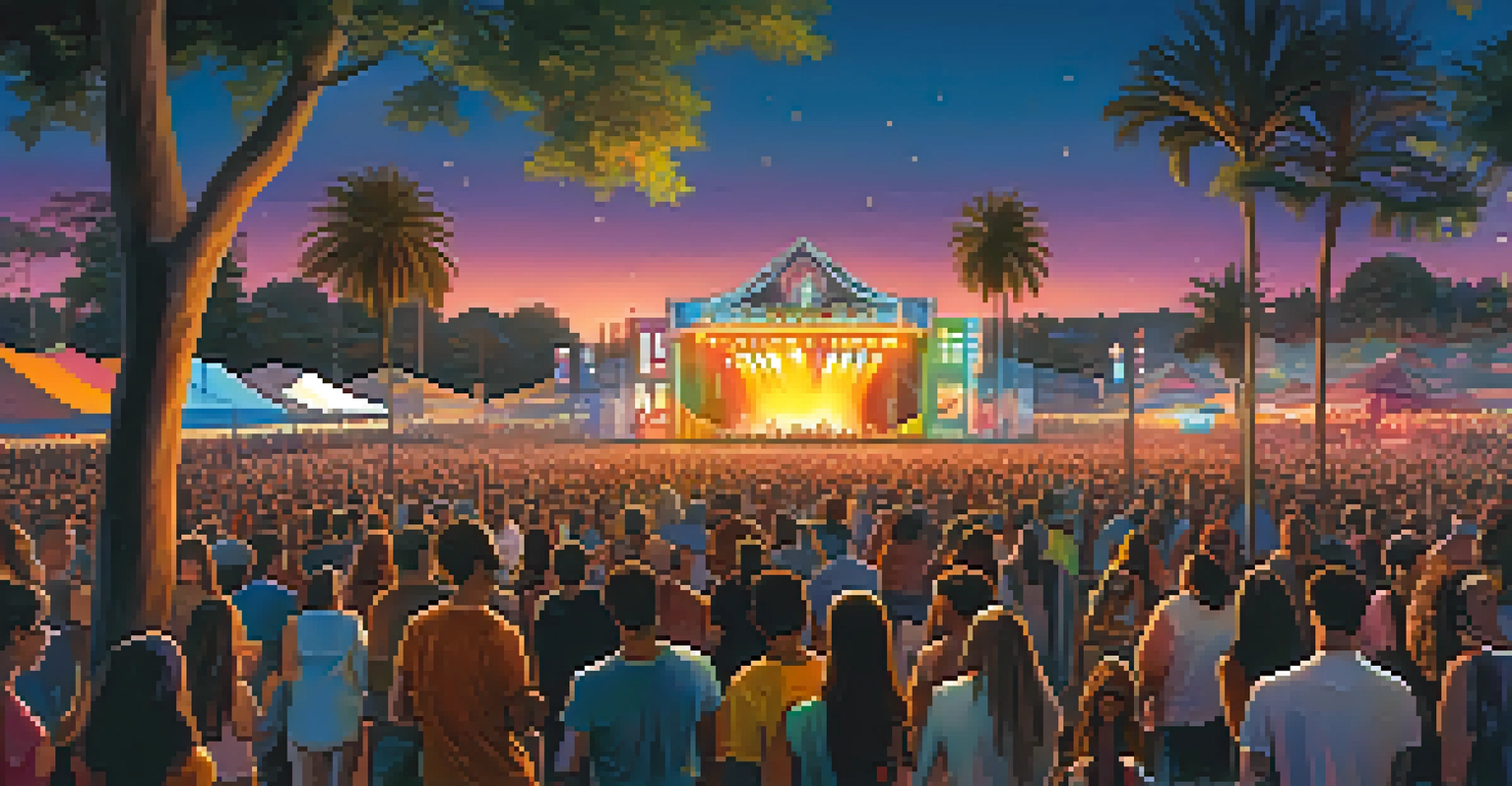Cultural Festivals: A Showcase of Diverse Entertainment Options

Understanding Cultural Festivals and Their Importance
Cultural festivals serve as a vibrant tapestry, weaving together traditions, arts, and community spirit. They are more than just events; they are celebrations of heritage that bring people together in meaningful ways. For instance, the Diwali festival in India showcases the beauty of lights and the triumph of good over evil through music, dance, and food.
Culture is the widening of the mind and of the spirit.
These festivals help preserve cultural identity and foster a sense of belonging among participants. They often highlight the unique customs and practices of different communities, giving attendees a chance to immerse themselves in diverse narratives. Whether it’s the captivating rhythms of African drumming or the intricate designs of traditional Japanese calligraphy, every festival tells a story.
Moreover, cultural festivals promote inclusivity by inviting people from various backgrounds to experience and appreciate different cultures. This exchange not only enriches attendees but also nurtures respect and understanding. As we explore this world of festivals, we discover how they enhance our global community.
A Journey Through Food Festivals Around the World
One of the most delightful aspects of cultural festivals is the food. From spicy street tacos at Dia de los Muertos in Mexico to aromatic curries during the Indian Holi festival, food plays a pivotal role in celebrating culture. It’s not just about satisfying hunger; it's about tasting history and tradition on a plate.

Food festivals also offer a glimpse into local culinary practices and innovations. These events often feature cooking demonstrations, allowing attendees to learn about traditional recipes and even sample them. Imagine savoring a fresh baguette at a French festival or indulging in authentic sushi at a Japanese event—each bite is a lesson in culture.
Cultural Festivals Unite Communities
Cultural festivals bring people together to celebrate heritage, fostering a sense of belonging and community spirit.
Moreover, food festivals foster community engagement by supporting local farmers and artisans. They provide a platform for vendors to showcase their products, creating a lively marketplace. This not only boosts the local economy but also encourages sustainable practices, making food festivals a win-win for everyone involved.
Music Festivals: A Universal Language of Joy
Music is often described as a universal language, and cultural festivals showcase this beautifully. Events like the Montreux Jazz Festival in Switzerland or the Glastonbury Festival in the UK attract artists and fans from around the globe, creating a melting pot of sounds and styles. These festivals celebrate not just music but the stories and emotions that come with it.
The arts are the most beautiful of all lies, for they lead us to the truth.
Live performances at these festivals offer a unique experience that can’t be replicated. The energy of a crowd swaying to the beat or dancing under the stars creates lasting memories. Whether it’s the soulful notes of a jazz ensemble or the electrifying atmosphere of rock music, each festival allows attendees to connect through rhythm.
Additionally, music festivals often highlight cultural diversity by featuring artists from various backgrounds. This exposure fosters appreciation and understanding of different musical traditions, enriching the global musical landscape. It’s amazing how a simple melody can bridge cultural gaps and unite people in celebration.
The Role of Dance in Cultural Celebrations
Dance is another expressive art form that plays a vital role in cultural festivals. From traditional folk dances to contemporary performances, dance showcases the rich tapestry of human expression. Events like the Rio Carnival in Brazil feature vibrant parades where samba dancers captivate audiences with their rhythm and flair.
Participating in dance during cultural festivals allows attendees to feel the pulse of the community. It’s not just about watching; it’s about joining in and embracing the joy of movement. Whether it’s a lively jig in Ireland or a graceful hula in Hawaii, dance invites everyone to let loose and celebrate together.
Food Festivals Showcase Culinary Arts
Food festivals offer a delicious way to experience local culinary traditions while supporting local farmers and artisans.
Moreover, dance often carries deep cultural significance, conveying stories and traditions passed down through generations. By learning about different dance forms, attendees gain insights into the values and history of various cultures. Ultimately, dance serves as a powerful medium for connection and cultural exchange.
Art and Craft Festivals: Celebrating Creativity
Art and craft festivals provide a platform for local artists to showcase their talents and creativity. From pottery and painting to textile art, these festivals celebrate the diverse expressions of human creativity. Events like the Edinburgh Festival Fringe highlight the rich artistic heritage of the region, drawing performers and visitors from around the world.
These festivals not only promote the arts but also encourage community involvement. Workshops and demonstrations allow attendees to engage directly with artists, learn new skills, and even create their own pieces. It’s a hands-on experience that fosters appreciation for the artistic process and encourages creative expression.
Furthermore, art and craft festivals often emphasize sustainability by featuring eco-friendly practices and materials. This focus not only supports local artisans but also raises awareness about environmental issues. By celebrating creativity, these festivals inspire a sense of responsibility towards both art and the planet.
Cultural Festivals: A Family Affair
Cultural festivals are often designed to be family-friendly, offering activities for all ages. From face painting and puppet shows to interactive workshops, these events create an inclusive environment where families can bond and explore together. For instance, the National Cherry Blossom Festival in Washington, D.C., features activities that engage kids and adults alike, making it a memorable outing.
These festivals also provide an opportunity for education and cultural exchange within families. Parents can introduce their children to new traditions, foods, and art forms, fostering a sense of curiosity and appreciation for diversity. It’s a chance to create lasting memories while learning about the world.
Technology Shapes Festival Experiences
The integration of technology into cultural festivals enhances engagement and accessibility, but balancing it with authentic experiences is essential.
Moreover, festivals promote social interaction among families, encouraging connections within the community. Sharing experiences at these events can lead to new friendships and strengthen community ties. In this way, cultural festivals play a crucial role in building a sense of belonging and togetherness.
The Impact of Technology on Cultural Festivals
In recent years, technology has transformed the way cultural festivals are experienced. Social media platforms allow for real-time sharing and engagement, enabling attendees to connect with others and spread the word about their favorite events. This digital presence has helped festivals reach a wider audience, promoting cultural awareness on a global scale.
Additionally, virtual festivals have emerged as a response to the challenges posed by events like the COVID-19 pandemic. These online experiences offer a way for people to participate from the comfort of their homes, ensuring that cultural celebrations continue despite physical limitations. It's a testament to creativity in maintaining cultural connections.

However, the integration of technology also raises questions about authenticity and the essence of cultural experiences. While digital platforms provide convenience, they can sometimes overshadow the genuine interactions that happen in person. Balancing technology with traditional forms of engagement is crucial for preserving the heart of cultural festivals.
Looking Ahead: The Future of Cultural Festivals
As we look to the future, cultural festivals will continue to evolve and adapt to changing societal norms and values. There’s a growing emphasis on inclusivity and representation, ensuring that diverse voices are heard and celebrated. This evolution reflects a broader movement toward understanding and embracing multiculturalism.
Sustainability is another key focus, with many festivals striving to reduce their environmental impact. By implementing eco-friendly practices and encouraging responsible tourism, festivals can contribute to the well-being of both communities and the planet. This shift not only enhances the festival experience but also promotes a sense of responsibility among attendees.
Ultimately, the future of cultural festivals lies in their ability to connect people, celebrate diversity, and foster understanding. As we embrace these celebrations, we are reminded of the beauty in our differences and the power of community. Let’s continue to support and participate in these vibrant showcases of cultural heritage.